| Shepherds of Christ Daily Writing |
 |
February 4, 2014
February 5th Holy Spirit Novena
Scripture selection is Day 6 Period II.The Novena Rosary Mysteries
for February 5th are Glorious.
Please pray - tune in on internet.Retreat in Clearwater, Florida
February 2nd - 5th
1:30pm and 6:20pm
Please tune in or come!Retreat in China
February 10th - 13th
Mass February 14th
Valentine's Day - China, Indiana
February 4, 2014
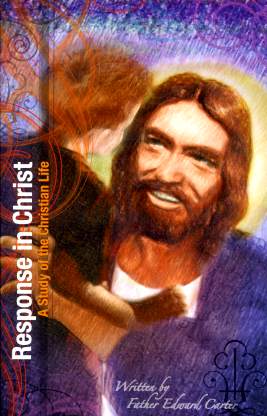
Excerpt from Response in Christ by Fr. Edward J. Carter, S.J. - Chapter 6
The Christian and Sin (excerpt)SIX
The Nature of Sin
What is the nature of sin? Contemporary theology emphasizes that sin is not primarily a violation of a law, but a disruption of personal relationships. Sin is a refusal to love. Serious sin is a radical refusal to love. Venial sin is a partial refusal to love.
The most obvious personal relationship that is affected by sin is that between God and the sinner. In sinning a man fails, to a lesser or greater degree, to accept God's loving gift of Himself. He fails also to respond with his own gift of love. In serious sin man refuses intimate friendship with God. In venial sin he dulls the ardor of that friendship. Man, in so far as he sins, maintains that he does not want his life to be directed by the loving hand of his heavenly Father. He wants to be a law for himself; he wants to be the one who decides what is good for himself and what is not. Schoonenberg observes: "Especially in the prophets sin is an aversion from and an unfaithfulness to Yahweh himself; hence it is placed in the heart rather than in the wrong deed. We see that aversion, that rebelliousness, that lack of faith which precede the act of transgressing the Law already in the story of the sin in paradise, where it is presented as the wish of possessing autonomously the knowledge of good and evil, of being independently the Law unto oneself. . .”1
As we sin and fail to love God, we close in upon ourselves. We prevent a further growth in openness to transcendence, to God and to His grace. We block off the source of our only real self-development and fulfillment. To the extent that we close in upon ourselves in sin, to that extent we feel the misery of sin. This misery of spiritual "self-enclosedness" is a faint participation in the essential pain of hell. The damned are eternally and completely closed in upon themselves, completely deprived of God and other personal relationships. This, then, is hell – the damned really experiencing no one but themselves. Hell is God's ratification of the choice which the unrepentant serious sinner has himself made. This choice is one of radical self-isolation.
Sin is primarily a refusal to love God, a refusal to be loved by Him, to be guided by Him. In sinning, man seeks for a false fulfillment, and therefore actually becomes impoverished. The great St. Augustine puts it this way: "For when the soul loves its own power, it slips from the common whole to its own particular part. Had it followed God as its ruler in the universal creature, it could have been most excellently governed by His laws. But in that apostatizing pride, which is called 'the beginning of sin', it sought for something more that the whole; and while it struggled to govern by its own laws, it was thrust into caring for a part, since there is nothing more than the whole; and so by desiring something more, it becomes less. . .”2
Yes, sin is an act disruptive of one's relationship with God. But sin has other dimensions also. It is a refusal to love other men as we should. For the Christian, sin is an offense against the covenant life of the People of God. In some way the sinfulness of the individual Christian makes itself felt in the corporate body which is the Church. The Christian, in sinning, is failing to love the corporate good of the People of God. He is failing to contribute his share to the progressive maturation in Christ of the total Christian community. The Christian in his sin becomes a burden to the People of God.
Sin also is an obvious refusal to love others in those instances when one directly harms others through his transgression. So many sins come under this category: theft, all forms of uncharity, social injustice, scandal, detraction. Furthermore, not only does one man often sin against another, but he frequently leads another into sin. In God's plan man is supposed to help his neighbor achieve his temporal and eternal happiness, but how often, even among Christians, the opposite is true. Not to make a positive contribution to the true growth of others is failure enough, but to be a positive hindrance is a far greater evil.
There is still another way in which the sinner refuses love to his fellowmen; when man sins he makes his contribution to the "sin of the world.”3 He thus adds to that huge, negative weight, nourished by the sins of the centuries, a weight which is always trying to draw man away from his God-given destiny. This mass of sinful ugliness, this "sin of the world," always has its considerable influence, but at times its hideousness makes itself especially manifest. The great race riots which have tragically risen up recently in various parts of the United States are examples of these special manifestations of the "sin of the world." Such events are not isolated instances of sins connected with race. In back of such tragedies there is a long history of grave social and racial sins, of seething hatred of white for black, and black for white. Such accumulated sinfulness in regard to race is part of the "sin of the world."
There are many other examples of these special manifestations of the "sin of the world." There are the world wars and the lesser wars, with their share of unbelievable accounts of the hatred which man can impose upon his fellowman. There are the histories of the various crime syndicates throughout the world with all their blatant categories of human degradation – narcotics, prostitution, terrorization and the rest. There are the sins of colonialism and the sins of communism.
The "sin of the world" with its stark and bold manifestations is a sickening reality. But a reality it is. And each man's sinfulness adds a little to this universal world sin. Each man's sinfulness contributes to sin's divisiveness. Man is intended to help Christ progressively unify all creation more and more into Himself. When man sins, he contributes to the disruptive and disunifying force of the "sin of the world."
Sin, then, because it is a failure to love God, man and the world, is selfishness. Sin seems to offer some sort of happiness, or advantage, or fulfillment. But this is a delusion. Sin can accomplish none of these things, because man's only real happiness and fulfillment comes from his authentic relationship in love with God, his fellowman and the rest of creation. Sin works against all these relationships.
Sin is so hard to understand because it is an absurdity. But if we are to grow properly in the Christian life, we must have some basic realization of what sin is, and of God's attitude towards sin and the sinner. Our best source for such a mature realization is given to us in the crucified Christ. In this figure we can know all the Father wants us to comprehend concerning sin. First of all, Christ crucified tells us very starkly of the overwhelming heinousness of sin. We know that sin is overwhelmingly evil because it alone could nail Incarnate Goodness to the cross. Secondly, Christ crucified speaks to us concerning the justice of God. God's justice does ask satisfaction for sin – yes, even that satisfaction which is the death of His Son. Thirdly, and very importantly for us poor sinners, the crucified Christ speaks to us unmistakably and overwhelmingly of the Father's great love and mercy towards us. Because of this love and mercy we can be so positive about human existence, for great as is the power of sin, the love and mercy of the Father, incarnated in His Son, is infinitely greater. This is our peace and consolation.
God's love and mercy moves the sinner toward repentance, and when the sinner repents, God's love changes him. In Isaiah the prophet we read: " 'Come now, let us talk this over, says Yahweh. Though your sins are like scarlet, they shall be as white as snow; though they are red as crimson, they shall be like wool.' " (Is 1:18).
Included in our sorrow for sin is a resolve to take the proper means and precautions to avoid sin in the future. One of the reasons we fall into the same sins with the same frequency is that we tend often enough not to go to the root causes of our failures, and, consequently, we often fail to apply the more efficacious remedies. All this not to say that we should become morbidly introspective in looking at sinfulness. However, without succumbing to this type of introspection, we all must allow for appropriate self-examination and self-knowledge.
Part of this self-examination and self-knowledge includes the manner in which I handle temptation in my life. The proper attitude toward temptation lies between two extremes. The person at one extreme is overly fearful of temptation, concentrates too much on avoiding it, and can even tend to equate temptation with sin. Such an attitude toward temptation breeds a negative mentality toward the Christian life, and detracts from the peace, joy and happiness which Christ wants us to experience.
The opposite attitude is that which is careless towards temptation. To take reasonable and grace-inspired precautions against temptation is not to be negativistic, but realistic. It is to realize that I am a sinner, and that there are various ways by which I can be led to sin. I cannot avoid all temptations, but out of loyalty to Christ, man and the world, I should not recklessly bring temptation upon myself.
Despite our best efforts there will always be some sin in our lives, unless God were to give extraordinary graces. There is only one human person, as far as our certain knowledge goes, who has been preserved from all sin. This person is Christ's mother, Mary. Let us remember this very important point, however. The Church's teaching that we cannot avoid all venial sin without a very special assistance from God refers to semi-deliberate venial sin. With God's ordinary graces we can avoid all fully deliberate sin, both serious and venial. It is this fully deliberate sin which is such an obstacle to our proper growth in the Christian life. Finally, let us remember that as we grow in Christ, even the number of semi-deliberate sins become fewer. ______
1. P. Schoonenberg, Man and Sin (Notre Dame, Indiana: Fides, 1965), p. 8.
2. St. Augustine, The Trinity, Bk. 12, Ch. 14 (Washington: Fathers of the Church, 1963), p. 356.
3. For one description of the "sin of the world", see Schoonenberg, Op. cit., pp. 98-123.
R. So the sinner does put something
before God. The sinner is wanting in
their relationship to God. A person can
want something so much for themselves
they sin to get what they want which
is violating their love of God and
their relationship with God and
others.
In a fit of passion or hatred,
one may sin against God and
others, and then, want to, when
seeing what they have done,
want to lie, to cover up their sin.
How does one who has seriously
sinned, rid themselves of the guilt
they feel, like the play Macbeth
by Shakespeare. The blood on the
dagger and the blood on her hands
were forever in her mind. She could
not wash the blood from her
memory of the killing.
We are here to grow in our
relationship with God and others.
God created us to love, to build
relationships, to be trustworthy,
to be pure, always operating
according to what God wants.
We see in the garden, Eve sinned and
she listened to the devil, then Adam
listened to Eve and he sinned. They
could not hide their sin from God.
We see they felt shame, they hid
themselves, they hurt their relationship
with God. God told them what to do
and they disobeyed God. They acted
against God's will - hurting their
relationship with God.
Life is about love, relationships,
trust, truth, compassion, but
obeying God's rules. When we sin
we hurt our relationship with
God. We can put our pride and
affection for ourselves before
serving God and do things against God
for our own power and glory over men.
What is important is love – It is the
greatest commandment of God – It
is a command – Even when someone
wrongs us - we do not have a right
to pull a hateful prank on them to get even –
We do not have a right to kill anyone
because they harmed us in some
dealings with some matter –
Purity of heart means our focus
is building things up – relationships
with God first, with men next – We
are concerned with loving others
according to God's will.
A violinist knows how to play and
make beautiful music, he can fix
the strings or have the bow fixed, he
has to fine tune the instrument and
can make beautiful music, beautiful
music, music in harmony with the
tunes of God. God intended us to make
music with our lives, music goes
out and its sound reverberates as
the sound travels, it can be a heavenly,
harmonious sound traveling in the
air.
If I played the violin, I do not know
how at all, it would not sound
so good. It takes practice to play
to have beautiful sounds. It takes
talent given from God.
In relationships we receive
God's help. In baptism we receive
a sharing in His life.
Excerpt from Response to God's Love - The Christian Virtues - Chapter 5
The spiritual life, which is centered in the pattern of death-resurrection, variously expresses itself through the Christian virtues. Although we will not offer a treatment of all the Christian virtues, nor by any means an exhaustive presentation of any of them, we will present some considerations concerning a number of them, including, of course, the three main virtues—faith, hope, and love. Faith and love are the most important of the Christian virtues because they assimilate us most intimately to God's life. God's life is a life of divine knowing and loving, and through Christian faith and love we participate in these Trinitarian operations. Hope, for its part, gives a very special support to faith and love.
Excerpt from Response in Christ by Fr. Edward J. Carter, S.J. - Chapter 8
However, in this present chapter, and extending through the next four, we will consider in a more detailed manner faith, hope and love, as well as certain other Christian virtues. The infused virtues, let us recall, are the supernatural faculties through which we express the paschal mystery in our lives.
R. Faith is participation in God's
knowing –
Fr. Carter "... we will complete our
treatment by considering faith as full
personal encounter with God
and man in Christ.
Faith gives the Christian a new
capacity for knowing. It enables
him to attain truths about God and
His creation which would be
otherwise unknowable..."
Faith as St. Thomas states
assimilates us to the divine
knowing.
2. Cf. St. Thomas Aquinas, In boeth. de Trinitate, q.3,a.1.
It has been foggy here in Clearwater.
It is weird to see bright beautiful
sun and then fog like I would think
in London. As I write here, my
lights don't work in my room
at the Virgin Mary building, if
I add the fog outside with the
"no light" situation in here, I can't
see too good, but God is shedding
this light given to me on this writing.
In baptism we receive gifts. Our
knowing and loving capacity are
elevated in this sharing in God's
life.
Faith, hope and love are theological
virtues.
Excerpt from Response in Christ by Fr. Edward J. Carter, S. J. - Chapter 8
1. Faith as Participation in God's Knowledge
Much of the current writing on faith stresses that this virtue constitutes a personal encounter.1 This is the emphasis we will also adopt. However, since this encounter of faith is initiated through the realm of knowledge, we will first discuss faith as participation in God's knowing. Then we will complete our treatment by considering faith as full personal encounter with God and man in Christ.
Faith gives the Christian a new capacity for knowing. It enables him to attain truths about God and His creation which would be otherwise unknowable. Faith also enables us to know certain truths which are within the grasp of natural reason, but which are attained by many only with difficulty.
Faith, as St. Thomas states, assimilates us to the divine knowing.2 Through faith we share in God's vision of reality, and we view God and creation in some way as does God Himself. This vision exists on a level of knowing which surpasses the intellect's natural capacity to grasp reality. Although faith gives only a faint share in God's vision compared to the divine knowledge itself, it is still the greatest vision of reality which is possible for man in his temporal existence.
What are some of the characteristics of Christian faith? First of all, it is at the same time both certain and obscure. Faith is certain because it is a special sharing in the knowledge of God, God who is the highest truth. The strength of my faith, then, depends not on arguments and proofs from reason. These give a rational foundation to my faith, but they are not faith itself. Rather, the strength of faith depends upon the degree to which God takes possession of the Christian in grace. As the Christian grows in grace, the various infused virtues take deeper root, and the Christian lives more and more the life of God. In regard to faith this means that the Christian is being more vitally assimilated into the divine knowing. His faith becomes more firm. This does not mean that we always correctly estimate the strength of our faith. For various reasons we can at times think that our faith is growing weaker when it is actually becoming stronger. Such an impression can be present as faith is being purified. This process of purification will be touched upon in the present chapter, but also later in the chapter on prayer and the one on the mystical life.
If faith is certain, it also has an obscurity about it, despite the fact that faith is also light. Faith is obscure because its realities are unseen. These truths of faith will be surrounded with a full brightness only in the beatific vision. Then faith will no longer be necessary. God and His truth will then be immediately present to us. "Now we are seeing a dim reflection in a mirror; but then we shall be seeing face to face. The knowledge that I have now is imperfect; but then I shall know as fully as I am known." (1 Co 13:12).
Because the truths of faith are not possessed here below with the complete light of the beatific vision, temptations against faith are possible. If these do occur, we should not be unduly disturbed. Great saints, such as St. Jane Frances de Chantal and St. Teresa of Lisieux, have experienced this trial. If temptations against faith occur, how should we handle them? We should not confront the temptation directly, for this only deepens its impression. We should let the temptation pass by as calmly as possible, taking reasonable means to occupy our attention with something positive. If we react correctly to the temptation, our faith will be strengthened and purified. Faith certainly can be purified in other ways. Consequently, we should not think it necessary to experience these temptations to achieve faith's purification. It is merely a question of properly benefiting from such an experience if it does arise.
Some seem to speak of temptations against faith in the same way as they do concerning difficulties about the truths of faith. We prefer to make a distinction. Although difficulties concerning faith can certainly lead to temptations to disbelief, it seems that such difficulties can be present without actual temptation against faith. This kind of difficulty or questioning can actually be a desire to understand more perfectly the mysteries of faith. Such questioning, as opposed to temptation to disbelief, can be handled directly through study, reflection and dialogue with persons competent in theology.
We are presently discussing some of the characteristics of faith. We have said that it is both certain and obscure. It is also evolving.3 By this we mean that the Church, as she progresses through the ages, is meant to strive constantly for a more perfect understanding of the truths of revelation. This is one sense in which the Church's faith evolves. It evolves also in the sense that the Church, reading the signs of the times, must constantly endeavor to present Christ's revelation in categories which are relevant to each succeeding age.4 The Church must so act because of the very nature of revelation. God has revealed Himself in Christ in order to exact a response from man. The Church also has to be concerned about the response which any age makes to her continual presentation of God's revelation. Since one of the factors which will determine man's response to God's word is its discernible relevance to his here-and-now existence, the Church is obligated to make her teaching of the faith as meaningful as possible according to all the various exigencies of each and every age.
The faith of the individual Christian likewise has an evolving dimension because his faith participates in the evolutionary growth of the Church's faith. But the Christian's faith evolves also precisely because it is the faith of an individual. One's understanding of the mysteries of faith can grow indefinitely. This growth will take place not only through the objective means commonly available to all within the Church, but also through the more subjective means which are peculiar to individuals as individuals. Consider the fact that one's faith evolves as his experience of life evolves. Faith is part of our total existence, and God often causes us to understand more perfectly the mysteries of faith by our actual experience of them in the concrete circumstances of our individual lives.
Christian faith is certain, obscure to some extent, and evolving. There is a final set of characteristics we would like to mention. As with all aspects of our grace-life, faith is both incarnational and transcendent.5 At the basis of faith's incarnational dimension is the fact that faith is received within this world's material framework. Faith partly depends upon the tangible and concrete for its proper nourishment, growth and expression. One example of this is faith's relationship to the liturgy with its very obvious incarnational dimension. Another example is that faith must be exercised within the ordinary framework of the Christian's everyday experience of work, relaxation, pain and joy. Again, such a framework of daily life has a very obvious material or incarnational aspect.
If faith is incarnational, it is more ultimately transcendent. The truths of faith, although having a relationship to man's material world, are themselves above it. This fact constitutes one aspect of faith's transcendency. Another aspect is the fact that our conceptual formulation and expression of the mysteries of faith do not completely exhaust their reality. This holds even for the Church's official teaching of these mysteries. It also holds true for theology's expression of the Christian mystery, and for the individual Christian's personal conceptualization of faith's realities, a conceptualization which must be, of course, in proper harmony with the Church's official teaching. Summarily, the mysteries of faith cannot be totally confined to our human categories of thought and speech. These are meant as means to lead us closer to faith's transcendent realities as they are in themselves, especially to the ultimate transcendent reality, our Trinitarian God.
In light of the above mention of theology, it might be well to consider here a few points concerning its relationship to faith. Theology is the science of faith, and its proper study can be a definite means in developing one's faith. But theology cannot be completely equated with faith. It obviously embraces much of faith's content, but it also contains and makes use of other realities. An example of this is the fact that theology utilizes philosophical categories in expressing revelation. Theology also is not obviously the same as faith in the instances when certain advanced speculations of various theologians are eventually seen to be erroneous. The Christian, while highly valuing theology, must realize in what manner it differs from faith itself.
This is especially necessary in our present age which is witnessing a ferment, renewal and vital growth in theology. It is always one of the tasks of theology to be in advance of the current official Church teaching.6 This necessary gap is especially evident today because of this very special age of the Church in which we live. This distance between the Church's official teaching and present theological effort seems to disturb many of today's faithful. If we hold fast to the above distinctions between faith and theology, we should be able to maintain our peace of soul and welcome the renewed vigor of today's theology. This vigor is making its own contribution to the growth of the Church's faith.
1. Cf. Pierre Teilhard de Chardin, The Divine Milieu (New York: Harper & Row, 1965), pp. 101-104.
2. Cf. Dietrich Bonhoeffer, The Cost of Discipleship (New York: Macmillan paperback, 1966), pp. 95-104.
3. For one particular discussion concerning contemporary asceticism see E. Larkin, "Asceticism in Modern Life" in Concilium, Theology in the Age of Renewal, Vol. 19 (New York: Paulist Press, 1966), pp. 100-108.
4. St. Thomas Aquinas, S.T., I-II, q. 24, a. 3.
end of excerpt
Prayer for Union with Jesus
Come to me, Lord, and possess my soul. Come into my heart and permeate my soul. Help me to sit in silence with You and let You work in my heart.
I am Yours to possess. I am Yours to use. I want to be selfless and only exist in You. Help me to spoon out all that is me and be an empty vessel ready to be filled by You. Help me to die to myself and live only for You. Use me as You will. Let me never draw my attention back to myself. I only want to operate as You do, dwelling within me.
I am Yours, Lord. I want to have my life in You. I want to do the will of the Father. Give me the strength to put aside the world and let You operate my very being. Help me to act as You desire. Strengthen me against the distractions of the devil to take me from Your work.
When I worry, I have taken my focus off of You and placed it on myself. Help me not to give in to the promptings of others to change what in my heart You are making very clear to me. I worship You, I adore You and I love You. Come and dwell in me now.
-God's Blue Book, January 17, 1994
Excerpt from Response in Christ by Fr. Edward J. Carter, S. J. - Chapter 8
In conclusion, let us be convinced of the following. What faith in Christ means for ourselves and others must engrave itself deeply within our souls. For only then will we have a desire to open ourselves up fully to this life of faith in Christ, and only then will we become the desired instruments in communicating this faith to others. Each of us in his own way must be caught up into the vision, the fire, the enthusiasm of St. Paul: ". . . I believe nothing can happen that will outweigh the supreme advantage of knowing Christ Jesus my Lord. For him I have accepted the loss of everything, and I look on everything as so much rubbish if only I can have Christ and be given a place in him . . . I want only the perfection that comes through faith in Christ, and is from God and based on faith." (Ph 3:8-9).
Excerpt from Response in Christ by Fr. Edward J. Carter, S. J. - Chapter 9
Christ, despite the suffering in His life, rejoiced greatly in the accomplishment of His work. Let us also, despite the pain and the effort and the suffering involved, rejoice greatly in the Christian task allotted to each of us. Let us realize that such rejoicing mingled with suffering is part of the death-resurrection involved in evolvement of the secular city. Just as death-resurrection was present in the life of Christ, just as it is present in the life of the Church and each Christian, so it is present in the evolving world order. Through the process of pain and effort and suffering we believe that the world is slowly but surely being more perfectly inserted into newness of life, into Christ's Resurrection. Through our Christian hope we desire to make our contribution to hasten the process. As we so labor with Christ we look ahead to the hour at which Christ will bring to completion His redemptive work. Then, as all becomes subject to Christ in perfect harmony, hope or expectation will be fully realized in regard to the entire universe. Let us recall the words of St. Paul: "After that will come the end, when he hands over the kingdom to God the Father. . . . And when everything is subjected to him, then the Son himself will be subject in his turn to the One who subjected all things to him, so that God may be all in all." (1 Co 15:24-28).
Excerpt from Response in Christ by Fr. Edward J. Carter, S. J. - Chapter 10
TEN Christian Love (Excerpt)
1. Our Need to Love and Be Loved
Christianity is fundamentally a life of love. The Christian is one who opens himself to God's love, and responds with a love of his own. The Christian also realizes that his life is not only a love relationship with God, but also a going out of his self-centeredness to other human persons in various forms of Christian love. Finally, the Christian is one who realizes that in one way or another he needs the love of others and is willing to open himself to this love.
The Church, the People of God, must increasingly give witness to these multiple dimensions of Christian love. To the extent that the Church fails to do so, to that degree does she fail to be a faithful continuation of the Incarnation. For the Incarnation is above all a manifestation of love, and this in various ways. First of all, Christ is the tangible and irrevocable expression of God's determination to communicate Himself in love to men: "Yes, God loved the world so much that he gave his only Son, so that everyone who believes in him may not be lost but may have eternal life." (Jn 3:16).
Christ is also the visible expression of mankind's response to God's love, for as man, Christ made this perfect response in love to His Father. Further, Christ is the overwhelming concretization of what it means to love one's fellowman. Finally, He is the visible manifestation of one who perfectly opens Himself to receiving love from others.
We Christians, the People of God, must continue these various manifestations of love contained in the Incarnate Word. By our lives we must give witness to the fact that we have opened ourselves to God's loving self-communication, and that we are responding to that love with all that we are. We must give evidence that we want to give ourselves to others in a life of loving service, and that we are open to the love which others graciously extend to us.
It is of prime importance that all forms of loving, human relationships flourish in the life of the Church. Examples of such relationships are those found in marriage and family life, religious life and other friendships. These relationships not only witness to our willingness to love others and be loved by them, but they are schools for such reciprocal love. These relationships increase my capacity to love others and increase my openness in receiving love. Furthermore, these various interpersonal relationships help me to be open in receiving God's love and responding to it. However, if these relationships are to be fully authentic, they themselves must be rooted in our love relationship with God.
2. Love of GodIt sounds so commonplace and obvious to say that God loves us. But if we could more perfectly realize what it means to be loved by God, our chances for complete transformation in Christ would be enhanced. With God's grace we must keep striving for a deeper comprehension of God's love. This love has brought us into existence, has redeemed us, and has given us a special mission in life. God in His love is ever with me, preserving me in life, asking me to accept Him more and more, desiring to take deeper possession of me in grace. God loves me, and He is my supporting rock, the one who will never fail me, the only one who can be my complete fulfillment.
God is the tremendous lover. And yet, we know that only too often we fail to respond to Him as we should. But we must keep trying. We must keep trying to fulfill more completely the commandment Christ has given us: "But when the Pharisees heard that he had silenced the Sadducees they got together and, to disconcert him, one of them put a question, 'Master, which is the greatest commandment of the Law? ' Jesus said, 'You must love the Lord your God with all your heart, with all your soul, and with all your mind. This is the greatest and the first commandment. The second resembles it: You must love your neighbor as yourself. . .' " (Mt 22:34-40).
St. Francis de Sales, a great spiritual master and a Doctor of the Church, aptly describes how we are to love God: "We have two principal ways of exercising our love for God; the first is affective and the second effective, or as St. Bernard calls it, active. By the first we have affection for God and what he loves. By the second we serve God and do what he ordains. The first joins us to God's goodness; the second enables us to fulfill his will. The first fills us with complacence, benevolence, and spiritual impulses, desires, aspirations, and fervors, and causes us to use the sacred infusions and minglings of our spirit with that of God. The second pours into us the solid resolution, firm courage, and inviolable obedience required to carry out the ordinances of God's will, and to suffer, accept, approve, and embrace all that comes from his good pleasure."1
. . .
3. Love of Man
"My dear people, let us love one another since love comes from God and everyone who loves is begotten by God and knows God. Anyone who fails to love can never have known God, because God is love. . . . Anyone who says, 'I love God', and hates his brother, is a liar, since a man who does not love the brother that he can see cannot love God, whom he has never seen. So this is the commandment that he has given us, that anyone who loves God must also love his brother." (1 Jn 4:7-21).
Our God is a God who knows and loves. This divine knowing and loving exists not only among the divine persons themselves. Father, Son and Holy Spirit also go out in knowledge and love to man and the rest of creation. Consequently, since our life in Christ is a share in God's life, we are called to love not only God, but also man and the rest of creation. The Christian has structured within his life of grace this deep desire – sometimes very latent – to give himself to his fellowman in various forms of love. If this desire is not thwarted, it can truly help change the face of the earth.
What are some of the characteristics of our love for others? First of all, our love of neighbor should exclude no one. It should embrace every single person the world over. As Christ's love for man was universal, so must ours be. And as Christ truly achieved good for men in His love for them, so must we. In other words, in our universal love for men we must be willing to act to help promote their good. We can at least do this in our prayer for their various material and spiritual needs. This constitutes no slight contribution of love, for prayer is one of the great means of channeling God's gifts to the world.
Secondly, our love for man must take the form of a life service in one form or other. Christ came to serve. He was fully the man for others. Can our lives be orientated in any other direction? Through our lives of loving service we make our contribution to God's creative and redemptive effort. God's love brought about creation and redemption. Our love united to His continues the process. Man and his universe are making their way back to the Father in Christ through the dynamism of love. It is interesting to note that this fact is at the heart of Teilhard de Chardin's cosmic evolutionary process in Christ.3 Teilhard, in contemporary thought patterns, is enunciating a traditional Christian truth.
Whatever the service is that we offer – as engineer, as doctor, as priest, as teacher, as mother, as nurse – it must be permeated with love. If it is not, it does not achieve its full effect in promoting God's creative and redemptive efforts.
At times it is only the motive of love which will keep a person faithful to his particular form of loving service. What but a deep love for her children supports a woman who has been deserted by her husband? What but a deep love of God and man can make a young man give up his family, the prospect of marriage, his homeland – all so that he may become a missionary priest? What but a deep love for the underprivileged can support an inner city worker amidst the squalor, the disease, the bitterness, the hopelessness which he meets daily? No, redemption cannot be continued without love – God's love or ours.
There is a final point concerning our service of love. We serve not only as individuals. At times we will be able to make our greatest contribution as a member of a group. This is an application of the communal dimension of Christianity. This common service could be as a member of a parish or civic organization, as a member of a religious order or a secular institute. There are numerous possibilities. One important thing members of such groups must realize: it takes love, sometimes great love, to remain properly selfless in group activity. There is no room in such group enterprises for the person who is always mistakenly looking for the wrong type of self-fulfillment at the expense of the particular organization. He who seeks his life shall lose it, and he who loses his life shall find it.
There is a third characteristic which must accompany our love for others. We must be willing to love without receiving love in return. This is a hard lesson for us to learn, but a most necessary one. Our Christian love is a participation in the love of Christ. And what is one outstanding feature of Christ's love? He has first loved man, and He has not always been loved in return. Yet Christ continues to love. In our love for others we also must be willing to take the initiative. God in His providence wants us to receive love from others also. But if this love seems to be lacking at times, or only faintly manifest, then God can supply for the lack. The important thing is that we ourselves keep on trying to love.
There is another characteristic of our love for man which pertains to those whom we directly encounter. Our love for these persons must manifest an appropriate human warmth. We are supposed to love God and man with our entire being. This means, in part, that our love is emotional. This is the way Christ as man loved, with His entire human nature. In the proper sense, Christ was a deeply emotional man. He wept in love over Jerusalem, and He wept in love at the tomb of Lazarus. We know also that the children loved to flock to Christ. He must have been a warm personality, for children shy away from those who are cold and austere. Our love, like that of Christ, must also be properly influenced by the emotions. Otherwise it is not a fully human love, and, therefore, not a fully Christian love.
In regard to our direct encounter with others, it is necessary that we be cognizant of another very important point. To a considerable extent, these persons experience God's love for them through ourselves and others like us. This is an application of the law of incarnation. God has loved man through the tangible, visible humanity of Christ. Christ no longer walks this earth, but the same principle holds true. We Christians are extensions of the heavenly Christ. In union with Christ we help in continuing the tangible, visible presence of God's love in this world. Through the love of our visible, concrete persons we continue incarnational love. In loving those whom I directly encounter in this manner – and let us remember I can love a person with a basic Christian love without "liking" things about him – I help to give them the courage to be and to become. Love received is a powerful force in developing the goodness in a person. Truly, when I love a person I help that person become what God destines him to be.
Furthermore, we in part show our love for others by allowing them to love us. A person grows by loving. In receiving love from others, therefore, we are loving them by giving them this opportunity to grow. We ourselves need this love which others give us. We are not self-sufficient beings; we are social beings who need others in so many different ways in going to the Father in Christ. We have to learn to open ourselves up to others and allow ourselves to be loved by them. At times in our pride we shrink away from this truth: that we need others – a need, of course, which must be always regulated by God's will. But we must resist these moments of pride that tell us we are self-sufficient. Remember, no man is an island.
Friendship with God and
others –
c) Friendship as a School of Love
Friendship is a form of Christian love. It is therefore intended by God to help make me a Christian who loves more sincerely, more deeply, more selflessly. Friendships are not meant to close in upon themselves. Through friendship we should be learning how to go out of ourselves anew in love to God and man. This is true because I cannot authentically love a friend without at the same time growing in my capacity to relate more deeply in love to God and others. In friendship I should be learning how to love more perfectly.
Since friendship is a school of love, it is evident why it cannot be exclusive. A friendship which makes me less loving towards others needs examination. Although, I have a special love for my friends, exclusiveness must be avoided. Jealousy or neglect of duty arising from a friendship are other indications that not all is right with the relationship. These and other possible negative characteristics should not overly surprise us if they appear, especially in a minor way. If they appear, they are merely a sign that we are still learning to love, and that at times we fail to some extent. However, negative characteristics, especially those of a serious nature, must be either eliminated or properly controlled. If there is a case of a serious disorder which cannot be corrected, the course of action seems obvious. The friendship – or what was a friendship – should be terminated, for the relationship has ceased to be a form of real Christian love.
As always, though, we should accentuate the positive. We should be optimistic about our friendships, confident that with God's grace they will always remain what they should be. This grace of God has been made concrete for us in the person of Christ. For the Christian, Christ should be present in every friendship. It is in His presence and with His help that our friendships are to be rooted. In this way they will flourish and become more beneficial, more profound and more beautiful.
5. Christian Love Exercised According to the Various VocationsSince the Christian life is rooted in love, all of its various vocations are primarily vocations to love. The single life in the world, the married life, the religious life and the priestly life, are all various life-forms in which the multiple dimensions of Christian love are to be exercised and experienced. In this context of Christian love we will make brief observations concerning each of these vocations. . . .
Finally, we now consider the celibate love of priests and religious. This type of love is also a life-form of loving. This form of Christian loving has its own particular contribution to make to the Church and world. One facet of this contribution is the powerful witness value of celibate love. The celibate priest and religious give an unmistakable manifestation that God has entered this world and given Himself in love to man. For celibate love, with its renunciation of marriage, is a striking testimony that God can seize a person with His loving grace and enable that person to sacrifice one of man's most treasured gifts, marriage. This visible witness of God's love among us is always a necessity in the Church, and no other vocation can give this witness in the same way as can that of publicly professed celibacy. . . .
In conclusion, we repeat that every state of life within the Church is fundamentally a particular life-form of Christian love. According to his vocation it is the primary task of the Christian to open himself to God's love and to respond to that love, to love man and to open himself to receive love from other human persons. These various dimensions of love are at the heart of our participation in Christ's death-resurrection. It is in trying to love properly that we really learn what it means to die with Christ. Receiving God's love and giving ourselves in return can cost us much, very much, at times. And to love others and open ourselves to their love can involve its own share of pain, hurt and frustration. Yes, to love properly truly means to die with Christ. Yet more importantly, to love properly also means to share in His Resurrection, His newness of life. Life here and hereafter is essentially a life of love. Without love there is no real happiness, no real joy, no real peace. If we are not willing to pay the price of loving, then we do not really wish to experience life in its fullness. For the Christian especially, to live is to love.
1. St. Francis de Sales, On the Love of God, Vol. 1, Bk. 6, Ch. 1 (New York: Doubleday Image Books, 1963), p. 267.
3. Cf. R. Faricy, Teilhard de Chardin's Theology of the Christian in the World (New York: Sheed & Ward, 1967), pp. 185-196.
R. Our knowing and loving capacity
is elevated in baptism –
We share in God's knowing
and loving capacity.
We must see this evolving with
God's grace as we develop
in our love for God and
others –
as we die to our selfish
ways and
know through the eyes of
God and
love through God.
As we live in Him –
...I have been crucified with Christ and yet I am alive; yet it is no longer I, but Christ living in me.
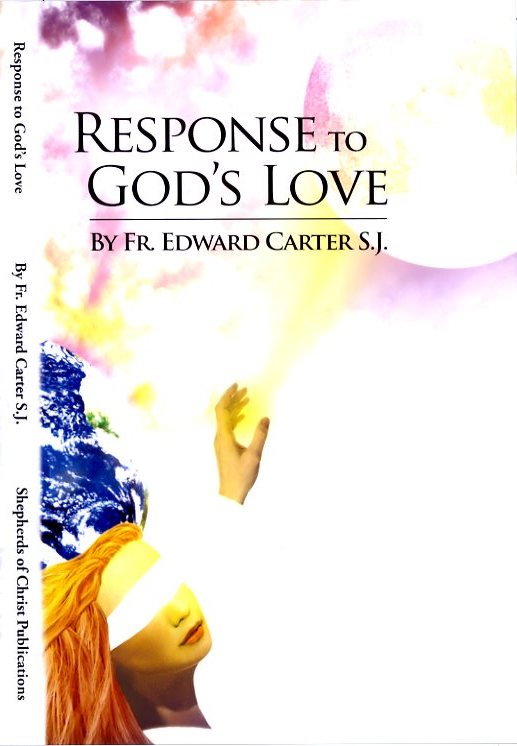
Excerpt from Response to God's Love by Fr. Edward J. Carter, S.J. - Chapter 1
The Incarnation, as we have briefly pointed out, was and is a rich and varied event. The truths that accompany Christ's descent into our world are numerous and capable of not only originally elevating us to a new life, but also constantly leading us to a deeper, richer, and more vibrant participation in that life. This is why Christ came to live in our midst—to give us life in abundance:
The Word became flesh
and made his dwelling among us.
. . . . . . . . . . . . . . . . . . . . . . . . .
Of his fullness
we have all had a share—
love following upon love.—Jn 1:14-16
R. The Incarnation goes on in us!
The incarnation goes on in us.
Loving as He loves in us. Excerpt
from Response to God's Love
by Fr. Edward Carter, S.J.
...
In reference to Christianity, God himself is the ultimate
mystery. Radically, God is completely other and transcendent, hidden
from man in his inner life, unless he chooses to reveal himself. Let us
briefly look at this inner life of God.
Excerpt from Response to God's Love by Fr. Edward J. Carter, S.J. -
Chapter 2 The word of the LORD came
to me thus:
. . . And finally, there are those
Christians who initially answer God's call and continue to answer it in an
eminently generous manner. They develop their uniqueness marvelously and
become forceful shapers of the world's Christic destiny. Their good actions
are deeply etched into the human process, although they may well be hidden
from public acclaim. Because of them and their actions, the world's goodness
is enhanced, and mankind has come considerably closer to fulfilling its
temporal and eternal destinies. Today's Church needs more of this
type of Christian. The Church and the world in which she is situated are
experiencing a time of crisis—perhaps the most critical time of all history,
for at what other time in human history could life as we know it on this
earth end so suddenly in a nuclear holocaust? Yet, although we live in an
age of special crisis that has tremendous and numerous problems, we also
live in an age of great opportunity. God, for his part, always provides for
the needs of both the Church and the world in which the Church is meant to
serve. Surely, in this age of great need and opportunity, God will not fail
to call Christians of all vocations to completely and eminently dedicate
themselves to the task at hand. We should pray that everyone will respond
according to their own uniqueness and make their own special contribution to
the work of Christ.
Excerpt from Response to God's Love by Fr. Edward J. Carter, S.J. -
Chapter 3
Our incorporation into the mystery of Christ at baptism initiates us
into a life that God intends to develop into full maturity. Our life
in Christ as guided by the Spirit is not a static given, a life that
is received in baptism and then simply clung to. It is not a life
that we are merely to avoid losing through serious sin. Rather, it
is our task to develop this life through a process of evolutionary
growth. God has truly placed us in a situation of becoming. Our personal uniqueness is meant to gradually
unfold into its full stature in Christ as we increasingly fulfill God's will
in deepening faith, hope, and love. . . .
We all follow the one and same
Christ and we must all have an attitude of complete openness, of expectancy
concerning the unpredictable, an attitude that will allow the Spirit to lead
us according to his way of forming us in the image of Christ. At
times we might have a too minutely preconceived idea of how we will become
in Christ and we are, therefore, somewhat rigid about the whole process.
Although the following of Christ is basically the same for all, how can we
be sure what particular path of imitation—mapped out in rather complete
detail—the Spirit has prepared for each of us? We can certainly be tempted
to think that we know with considerable certainty the way in which our
becoming in Christ should logically evolve. We must learn, however, to
balance an attitude of stability that is rooted in a certain way of life, a
certain way of following Christ, with a spiritual freedom that makes us
really open to what the Spirit wants of us, however surprising, novel, or
unusual this may seem.
Excerpt from Response to God's Love by Fr. Edward J. Carter, S.J. -
Chapter 4 Our incorporation into the mystery of
Christ at baptism, and the gradual maturing of that life in the
process of becoming, is centered in the pattern of
death-resurrection. Indeed, the theme of death-resurrection is at
the heart of salvation history. Let us briefly consider its place in
the Old Testament, in the New Testament, and in God's ongoing
self-communication, always remembering that any form of death—that
is, any form of suffering—is meant to lead to greater life, greater
peace, and greater happiness. The theme of death-resurrection is at
the heart of Old Testament history. The Jewish people, under the leadership
of Moses, experienced death-resurrection as they were formed into the people
of the covenant—Yahweh's people. In the great Exodus event, they escaped
Egyptian slavery, went on to Mt. Sinai where the covenant was ratified, and
then progressed to the Promised Land. As members of the Mosaic covenant—as
Yahweh's people—the Jews experienced a religious transition; they passed
over to a higher level of religious existence, to a more intimate union with
God. This religious transition contained
death-resurrection. For the Jews to become people of the covenant, to remain
so, and to grow in the life of the covenant, it was necessary that they
undergo a mystical or spiritual death. In short, the Jews had to be willing
to pay a price; they had to be willing to bear with that which was difficult
in covenant life; they had to be willing to die to that which was not
according to Yahweh's will. This mystical death, however, had a very
positive purpose; it was directed at life in the covenant and at growth in
that life. This spiritual death, in other words, was aimed at resurrection. Christ perfectly fulfilled the Old
Testament theme of death-resurrection. In doing so, he, too, was
experiencing a religious transition. He was passing over—gradually, at
first, and then definitively in his death—to a new kind of existence, to the
life of his resurrection, which he achieved not only for himself, but for
all mankind. To achieve this new life of resurrection, Jesus was willing to
pay the price; Jesus was willing to suffer, even unto death. That it had to
be this way—that the only way Christ could have achieved resurrection was
through suffering and death—was pointed out by Jesus himself to the two
disciples on the road to Emmaus: "Then he said to them, 'What little sense
you have! How slow you are to believe all that the prophets have announced!
Did not the Messiah have to undergo all this so as to enter into his glory?'
Beginning, then, with Moses and all the prophets, he interpreted for them
every passage of Scripture which referred to him" (Lk 24:25-27). Though he was
harshly treated, he
Excerpt from Response to God's Love by Fr. Edward J. Carter, S.J. -
Chapter 6 The Church is the Body of Christ. One
of the truths that is emphasized by this concept is the idea of community.
The communion that binds the members of the Church together is, in turn,
connected with that wider idea of community that embraces the whole of
mankind. . . . The Christian community, in turn,
develops when those who make up that community develop as authentic
Christians. Just as each divine person contributes perfectly to the
community life of the Trinity according to the perfect fullness of his
personhood, so each Christian contributes to community life in proportion to
the degree of his or her personal development. Authentic interpersonal relationships
help to develop community. The Trinitarian community is a community of
profound relationships. Because we reflect Trinitarian community, we are
intended to have relationships not only with the persons of the Trinity, but
likewise with one another. Authentic interpersonal relationships not only
unite in a deeper knowledge and love the persons directly involved, they
also make a person more capable of loving others more deeply and, therefore,
more capable of deepening the bonds of total community. If a person is
growing in the capacity to love his or her friends, for example, that person
is concurrently growing in the capacity to also love others—both those who
are members of the Church and those who are not. The concept of the Church as Body of
Christ certainly emphasizes the sense of corporateness that should permeate
the consciousness of the Church's members. We must think in terms of both
what is good for the entire Church and, through this Church, what is good
for the total human community. Even when we disagree among ourselves, we do
so not because we want to glory in having the upper hand, but because we
believe that to disagree here and now is necessary so that the truth might
better emerge for the good of the community. St. Paul speaks to us about
this sense of corporateness: "In the name of the encouragement you owe me in
Christ, in the name of the solace that love can give, of fellowship in
spirit, compassion, and pity, I beg you: make my joy complete by your
unanimity, possessing the one love, united in spirit and ideals. Never act
out of rivalry or conceit; rather, let all parties think humbly of others as
superior to themselves, each of you looking to others' interests rather than
his own" (Phil 2:1-4). . . . As we end our discussion of the
Church, the Christian community, let us recall the words of St. Paul: "Let
us, then, be children no longer, tossed here and there, carried about by
every wind of doctrine that originates in human trickery and skill in
proposing error. Rather, let us profess the truth in love and grow to the
full maturity of Christ the head. Through him the whole body grows, and with
the proper functioning of the members joined firmly together by each
supporting ligament, builds itself up in love" (Eph 4:14-16).
In this weather we need to We need to make reparation
for all Here is a tremendous offer
Jesus The Lady of Lourdes Statue
This statue is very
beautiful –
Great grace is promised to
those who . as a
Prayer Group Special Lady of Lourdes Celebrate Mary's In honor of Our Lady of Lourdes
Postage Free in US
Call
Regina 1-727-776-2763 Special
Sale Statues with image glass
12" Sacred
Heart of Jesus
15" Pilgrim Virgin Fatima
12" Our Lady of Fatima 11" Our Lady of Fatima plus shipping Call
Regina 1-727-776-2763
Blue Book 11 -
$5.00 plus postage
We are living in Him –
putting on Christ –
The
Father, in a perfect act of self-expression, in a perfect act of
knowing, generates his son. The Son, the Word, is, then, the immanent
expression of God's fullness, the reflection of the Father. Likewise,
from all eternity, the Father and the Son bring forth the Holy Spirit in
a perfect act of loving.
At the destined
moment in human history, God's self-expression, the Word, immersed
himself into man's world. God's inner self-expression now had also
become God's outer self-expression. Consequently, the mystery of God
becomes the mystery of Christ. In Christ, God tells us about himself,
about his inner life, about his plan of creation and redemption. He
tells us how Father, Son, and Holy Spirit desire to dwell within us in
the most intimate fashion, how they wish to share with us their own life
through grace. All this he has accomplished and does accomplish through
Christ.
"Before I formed you in the womb I
knew you,
before you were born I dedicated
you,
a prophet to the nations I appointed
you."
"Ah, LORD GOD!" I said,
"I know not how to speak; I am too
young."
But the LORD answered me,
"Say not, 'I am too young.'
To whomever I send you, you shall
go;
Whatever I command you, you shall
speak.
Have no fear before them,
because I am with you to deliver
you, says the LORD."
—Jer
1:4-8
submitted
and opened not his mouth;
Like a lamb led to the slaughter
or a sheep before the shearers,
he was silent and opened not his
mouth.
Oppressed and condemned, he was
taken away,
and who would have thought any
more of his destiny?
When he was cut off from the land of
the living,
and smitten for the sin of his people,
A grave was assigned him among the
wicked
and a burial place with evildoers,
Though he had done no wrong
nor spoken any falsehood.
—Is
53:7-9
pray for all those suffering
from the weather.
the sins against God's will
Mary and Jesus have said.
told us to make.
with Glass.
It is hand painted and
handmade
With the image glass from
Mary's image head.
pray the Shepherds of Christ Prayers
. as a Family
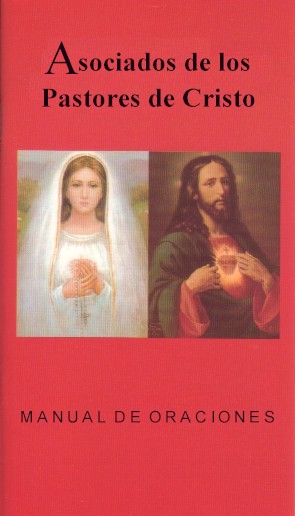
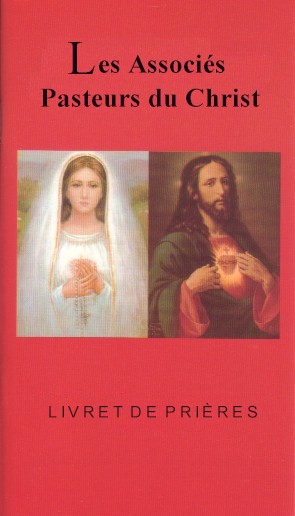
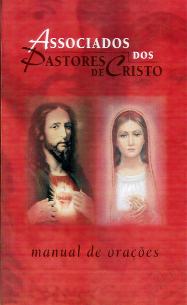
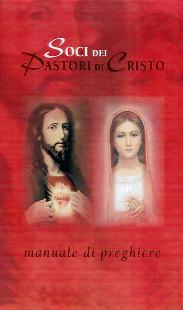
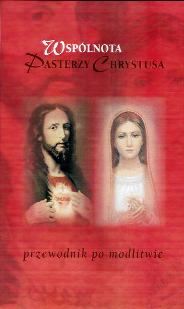
Offer
Immaculate Conception
with a gift for Valentine's Day
for yourself or someone you love.
or come to our Centers!
12" Statue of Our Lady of Lourdes
with glass from Mary's image face plus
the DVD of the Miracle of Our Lady of Fatima
and Blue Book 8


All for $78.00
while supply lasts!
Call
Rosie 888-211-3041
Originally $200 - on Sale for $100
Originally $200 - on Sale for $85
Originally $160 - on Sale for $75
Originally $150 - on
Sale
while supplies last
Call
Rosie 888-211-3041

Call Rosie 1-888-211-3041
Give a gift that counts.
In Spanish with the
Imprimatur

Also we are ready to print
5000 copies of the
Parents and Children's Rosary Book
in SPANISH.
Can you help with a donation?
Give the gift that counts.
Give to your priests Fr. Carter's Books plus postage.
Tell My People $5.00
Response to God's Love $8.00
Response in Christ $8.00
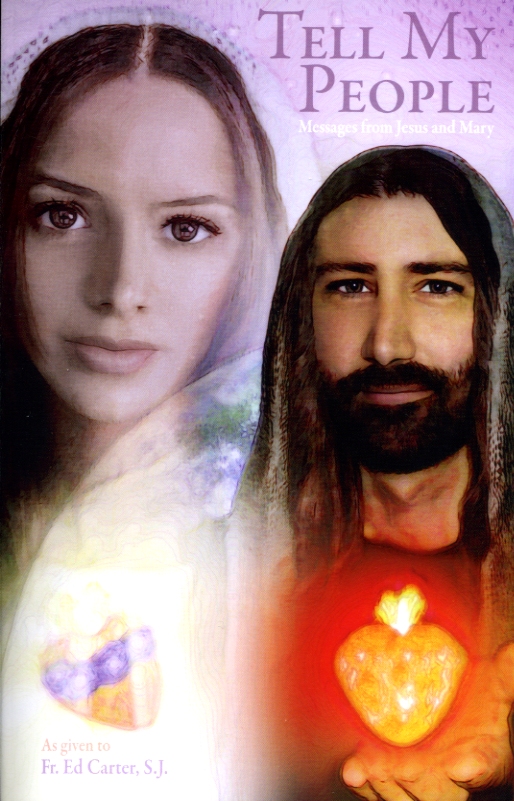


God's Blue Books 4, 5, 6A, 6B, 6C, 7, 8, 9, 10
|
|
|
|
|
|
|
|
|
|
|
|
Old
Mass Books with the Imprimatur
$2.00 plus postage

New Mass Book with
Imprimatur
$8.00 plus postage
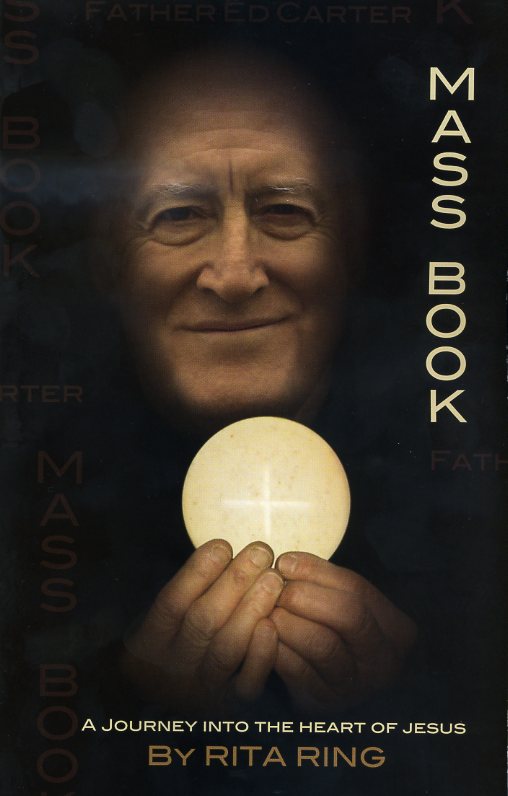
New Parents & Children's Book with the Imprimatur
$8.00 plus postage

Fr.
Joe's Cycle A - Steadfast to the Sun - Starts in Advent
$5.00 plus postage
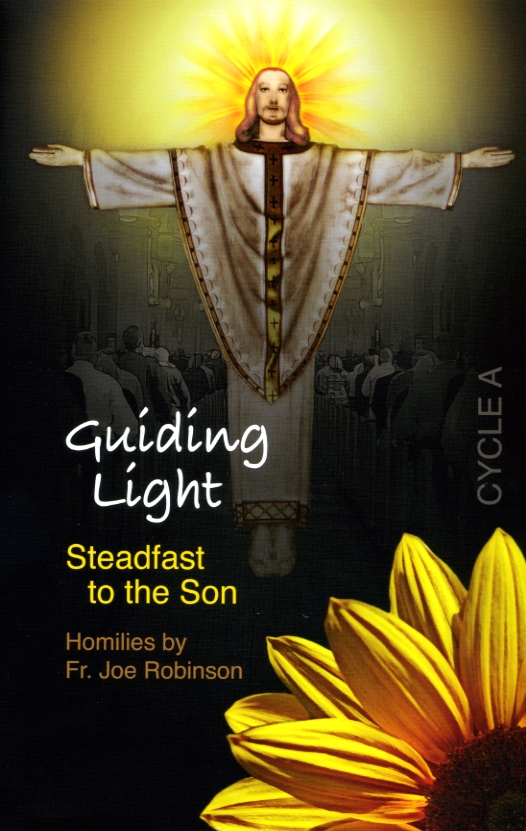
Give the gift that keeps on giving!
Give to your priest.
Fr.
Carter's Priestly Newsletters Book II
$6.00 plus postage

Special sale statue with glass
27" Statue of Our Lady of
Fatima
$175 plus postage
Get a canvas print of Mary's image
with a sliver of glass and a little
bottle of Jesus and Mary water.
The glass will be fixed behind the
back of the picture.
$200.00 plus postage

Dan called and gave the report to me, when I hung up I saw this rainbow and took a picture for him.
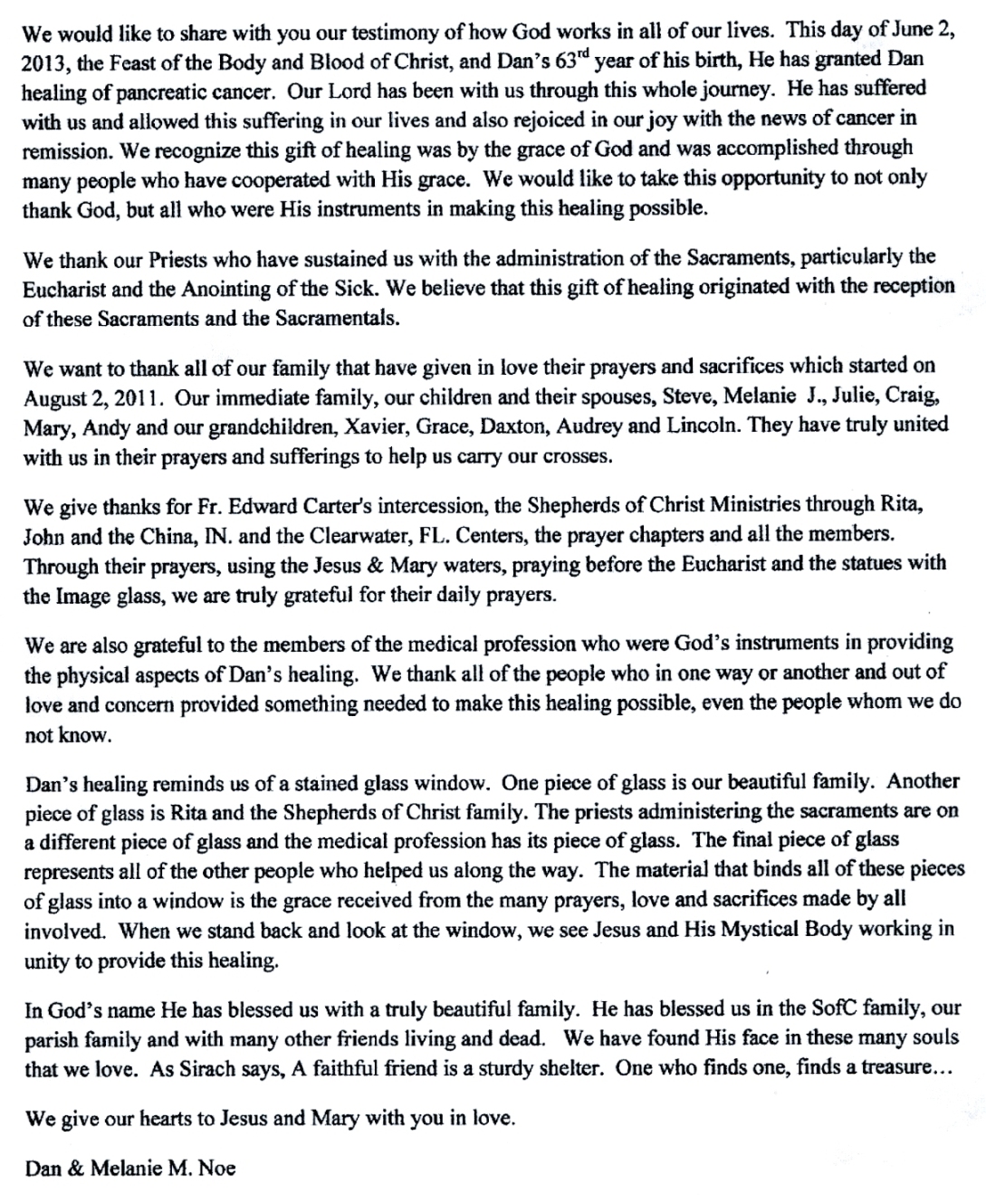
|
Rita Ring |
|
|
|
||
Mass Book,
by Rita Ring: Many of the entries in the Priestly Newsletter
Volume II from a spiritual journal came from this book.
These entries |
||
|
|
|||
Rosary Meditations
for Parents and Children,
by Rita Ring, Short Meditations for both
parents and children to be used when
praying the |
|||
|
|
||
God's Blue Book I by Rita Ring. Open Anywhere — This book will change your life. These are beautiful love letters to us from Jesus. A million books have been printed and circulated. Jesus loves us so much — He wants a personal relationship with us — He wants us to go to the Eucharist and be with Him before the tabernacle. $10 |
||
|
|
||
God's Blue Book II by Rita Ring. Letters from Jesus about His on fire love — Jesus wants this great intimacy with us — On fire love — Personal love letters from Jesus about the love of His Heart — A book on surrender Fr. Carter said! $10 |
||
|
|
||
God's Blue Book III by Rita Ring. Fr. Carter's favorite book — It is about loving and forgiving each other — Being pure in heart — A book for unity in family, community, in life!! $10 |
||
|
|
||
God's Blue Book IV by Rita Ring. This book is about the love Jesus has for Mary and Mary has for Jesus and Jesus and Mary have for us — It is truly the Love of the Two Hearts. Mary appeared every day at the Holy Spirit Center — Fr. Carter was there. Mary's first apparition July 5, 1994. $5 |
||
|
|
||
God's Blue Book V by Rita Ring. Jesus wants to be the bridegroom of our soul — He is our beloved — Jesus tells us about pure love — how we are to be pure of heart and love God and love others. It is a must, to hear about love from Jesus — Jesus is love — $5 |
||
|
|
||
God's Blue Book 6A by Rita Ring. Rosaries from Their Hearts during apparitions. Jesus and Mary appeared every day and I received rosaries from Them and They were transcribed from a tape. Also messages of love from Jesus on days of January, 1995 — About Baptism — writings from Fr. Carter and the Scriptures. $10 |
||
|
|
||
|
|
God's Blue Book 6B by Rita Ring. Jesus and Mary appeared every day in February, 1995 — So beautiful — transcribed from a tape — the Stations, 7 Sorrows, prayers in the Prayer Manual, the Holy Spirit Novena Book and the Song Book. Pure love — loving and forgiving — a book about Jesus' love, baptism, grace and Fr. Carter's Newsletter. $10 |
|
Rosaries from the Hearts of Jesus and Mary Book 1. Mary appeared in Clearwater December 17, 1996 in rainbow color and these rosaries left the printer the same day from Apparitions of Jesus and Mary — transcribed from a tape. $10 |
||
|
|
||
Rosaries from the Hearts of Jesus and Mary Book 2. This is a book of so many rosaries - transcribed from a tape. So many beautiful rosaries. pages $12 |
||
|
|
||
Short Rosary Meditations for the Elderly, Ill and Homebound. This book is so important with pictures they can open it and lay it on their laps and pray the rosary. $10 |
||
|
|
|
|
Messages From Jesus
$ 10.00 plus postage |
|
|
Messages for the Elderly, Ill and Homebound. This is a big book of loving messages for nursing home people and homebound from Jesus and Mary — Their lives are so important — united to the Mass offering up their suffering, their lives for the souls of this earth. $10 |
|
|
|
||
Daily Messages from Heaven. First book of Daily Messages. $10 |
||
|
|
||
|
||
|
|
||
Color the Lives of Jesus and Mary. Volumes 1 through 7. Coloring books and meditations for grade school children and others on the mysteries of the rosary - really good. $5 each. |
||
Coloring the Lives of Jesus and Mary Books 6 and 7
Mysteries of Light
$ 5.00 each plus postageColor the Lives of Jesus and Mary. Volumes 6 through 7. Coloring books and meditations for grade school children and others on the mysteries of the rosary - really good. $5 each.
God's Blue Book I on CD, Disk #1
God's Blue Book I, Disk #1 Read by author: Rita Ring. Discerned by: Fr. Edward J. Carter S.J.
$ 10.00 plus postage
Mysteries of Light Rosary Book
Rosaries From the Hearts of Jesus and Mary - Volume I
$ 5.00 plus postage
Mysteries of Light Rosary Book
Rosaries From the Hearts of Jesus and Mary - Volume II
$ 5.00 plus postage
Apostle's Manual
Shepherds of Christ Overview: Very carefully discerned by Fr. Edward J. Carter S. J.
$ 20.00Apostles Manual. About the Movement - the structure of the Movement — All Ministries - from the time 3 months before Mary appeared in Clearwater and 3 months after. Rosaries of the 13ths, Fr. Carter's Newsletters. Messages from God the Father — Reaching the priests, the Church, the schools and the world. $20
Songs From Jesus
Given by Jesus to His Messenger Author: Rita Ring. Discerned by: Fr. Edward J. Carter S.J.
$ 3.00Songs from Jesus Songbook. These loving songs were given from Jesus. So beautiful — Love Songs from Jesus of His love - helping us have pure and loving hearts. $3
Shepherds of Christ Holy Spirit Novena
Holy Spirit Novena by: Rita Ring
$ 1.00 plus postageHoly Spirit Novena Booklet. In four languages with the Imprimatur with 18 scripture readings for two complete novenas – this very powerful Holy Spirit Novena has prayers for prayers for Protection by the Blood of Jesus, Healing, Strength and Light, To Be One with God, Father, Son and Holy Spirit, One with Jesus, To Dwell in the Hearts of Jesus and Mary, Prayer for the Holy Spirit and His Gifts, and the Word Alive in Our Hearts. All these prayers take about 10 minutes daily recited out loud. $1
Shepherds of Christ Holy Spirit Novena CD
Holy Spirit Novena Read by: Rita Ring
$ 10.00 plus postage
Holy Spirit Novena CD. Prayers and scripture readings from the Holy Spirit Novena Booklet read by Rita Ring. $10
Colorea 1 thru 5
las vidas de Jesús y María (recibido el Imprimátur)
$ 5.00 each plus postage
Para Comprender Mejor La Santa Misa
Una Jornada Hacia el Corazón de Jesús
$ 10.00
Meditaciones del Rosario
para Pequenos y Ancianos
$ 10.00
Fr. Joe Robinson
Guiding Light
- Reflect on the Word
Guiding Light homily series - Reflect on the Word - Cycle
B — The Word leaves an impression on our souls. In my thoughts and
reflections are born a more tangible understanding of these eternal
concepts presented in the Gospels and the readings. Anyone can read a
sentence, but not anyone can absorb it's true meaning. Truth, in this
day and age, is almost a matter of opinion or individual entitlement. We
believe that Christ's truth is our Roman Catholic Church. We, as
priests, champion it's teachings; we are ambassadors for the Pope and
Christ to those faces looking at us. We are the light by which our
congregation reads to reflect upon real truth and we do it hand in hand.
$15
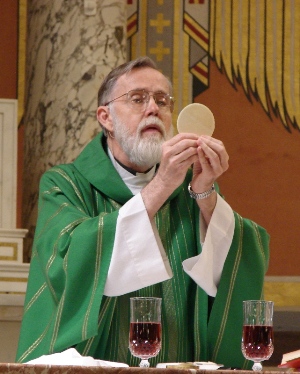
Fr. Joseph Robinson has dedicated his
life to serving Christ and the Church
for over 40 years.
![]()
Inspiring Homilies Covering Cycle B of the
Liturgical Year
$ 15.00
plus postage
|
|
Guiding Light homily series - Steadfast to the Son - Cycle A — The sunflower is a great example of how we should be steadfastly guided by light. What a powerful thought that this exceptional plant is not stuck in one pose day in and day out, yet adaptable and magnetized to the sun. We feel the same about our Son. Our heads turns to face Christ as each day presents its challenges to find light. We join together like plants in a field and soak up the Son through the pulpit. We are a warm circle of strength using the wind of our breath to carry our priests' words, Christ's words, to new rich soil. $15 | ||
|
|
Guiding Light - Feed My Soul - Cycle C — In a world rapidly advancing and encouraging personal gain, we are faced with modern problems. There is a challenge to find time in our busy schedules for Sunday Mass or a family meal. We are able to research, shop, bank and even work without hearing one human voice. It is no wonder that we may often feel disconnected and famished at our week's end. In Fr. Joe's third book of homilies from Cycle C, we are reminded of the charity that Christ intended us to show each other. We have a calling to turn the other cheek and be the Good Samaritan to others. We are rewarded with the Father's kingdom and love when we are not worthy. We are not left alone or hungry. $15 |
Guiding Light - Focusing on the Word - Cycle B — At times we may feel that our path to Christ is a bit "out of focus". Like the disciples in the Book of Mark, this ordinary life clouds our vision of Christ's Divinity. We may doubt the practicality or possibility of applying His teachings and example to our modern life. Cycle B's homilies are a "guiding light" to help us realize Jesus' Messianic greatness and His promise of better things to come. $15 |
|
|
Guiding Light - The Word Alive in Our Hearts. - Cycle A (partial) — Homilies by the Reverend Joe Robinson given at St. Boniface Church in Cincinnati, Ohio. It is a tremendous honor Fr. Joe has allowed us to share these great gifts with you – for greater holiness and knowing more and more about God. $10 |
|
Fr. Edward J. Carter |
|
|
||||||||||||||||||||||||||||||||||||||||||||||||||||||
|
|
Special 27" Pilgrim Virgin of Fatima/Clearwater Statue with Glass
27" Statue with crown
$ 450.00 plus shipping
Special 18" Pilgrim Virgin of Fatima/Clearwater Statue with Glass
$ 250.00 plus shipping
Special 15" Pilgrim Virgin of Fatima/Clearwater Statue with Glass
White gown with gold trim around mantel
$ 200.00 plus shipping
Special 12" Pilgrim Virgin of Fatima/Clearwater Statue with Glass
White gown with gold trim around mantel
$ 160.00 plus shipping
Special 18" Our Lady of Fatima/Clearwater Statue with Glass
Blue and Pink gown with a rosary over her hand.
$ 250.00 plus shipping
Special 11" Our Lady of Fatima/Clearwater Statue with Glass
Blue and Pink gown.
$ 150.00 plus shipping
Crucifix by Felix - Hand Carved
Crucifix with incredible detail!
$ 750.00 plus shipping
Imitation of Two Hearts
Giclee Art Print on Canvas
$ 150.00 plus shipping
Lucia's Vision
Giclee Art Print on Canvas by Harold Kellner
$ 150.00 plus shipping
Mary's Image 12 x 16
Giclee Art Print on Canvas of Mary's image with a sliver of glass and a little bottle of Jesus and Mary water. The glass will be fixed behind the back of the picture.
$ 200.00 plus shipping
Blue Crystal Rosary
Rosary with the Image of Our Lady of Clearwater
6mm - $ 30.00 plus shipping
8mm - $ 40.00 plus shipping
Red Crystal Rosary
Rosary with the Image of Our Lady of Clearwater
6mm - $ 30.00 plus shipping
8mm - $ 40.00 plus shipping
Clear Crystal Rosary
Rosary with the Image of Our Lady of Clearwater
6mm - $ 30.00 plus shipping
8mm - $ 40.00 plus shipping
Mug
Mug with the Image of Our Lady of Clearwater
$ 15.00 plus shipping
Call Rosie
1-888-211-3041
or
1-727-725-9312
Statues
OL-Guadalupe
w/glass - 28
OL-Grace
w/glass - 24OL-Mt. Carmel
w/glass - 24
OL-Lourdes
w/glass - 24
IH-Mary
w/glass - 24
IH-Ivory
w/glass - 24
SH-Jesus
w/glass - 24SH-Blessing
w/glass - 24
Sorrow M
w/glass - 24
Inf.-Prague
w/glass - 24
OL-Lourdes
w/glass - 18
OL-Mt. Carmel
w/glass - 18I Heart
w/glass - 18
I Heart - Ivory
w/glass - 18
OL-Grace
w/glass - 18
SH-Jesus
w/glass - 18OL-Guadalupe
w/glass - 12
PV-Fatima
w/glass - 27
PV-Fatima
w/glass - 18
PV-Fatima
w/glass - 15
OL-Fatima
w/glass - 18
PV-Fatima
w/glass - 12
OL-Fatima
w/glass - 11
St. Padre Pio
St. Joseph
St. Therese
St. Francis
St. Anthony
St. Claire
Limpias
St. Jude

Divine Mercy
Holy Family
Angel
St. Philomena
Pieta - Marble
Pieta - Color
Holy Family 12
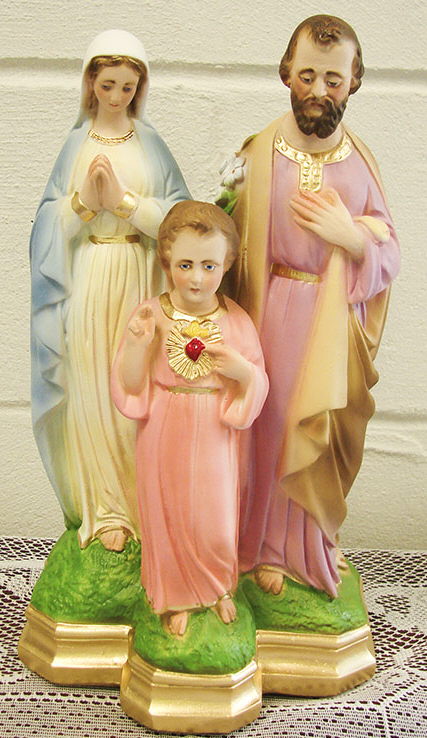
St. Anthony - 18
St. Francis - 18
St. Joseph - 18
St. Therese - 18
St. Rita - 18
St. Clare - 12

St. Rita - 12
St. Padre Pio - 12
Divine Mercy - 12
St. Michael - 11
Limpias - 8
Shepherds of Christ Ministries
P. O. Box 627
China, IN 47250
Toll free - 1-888-211-3041
Local - 1-812-273-8405
fax - 1-812-273-3182
web: www.sofc.org
e-mail: info@sofc.org
Size
Price
Quantity
Holy Family
24"
$180
Limpias
24"
$125
St. Anthony
24"
$125
St. Claire
24"
$125
St. Francis
24"
$125
St. Joseph
24"
$125
St. Jude
24"
$125
St. Padre Pio
24"
$125
St. Therese
24"
$125
Divine Mercy 22" $125
Angel 22" $100
St. Philomena 20" $100
St. Philomena 16" $65
St. Joseph 18" $65
St. Francis 18" $65
St. Anthony 18" $65
St. Rita 18" $65
St. Therese 18" $65
Pieta - Color 15"
$125
Pieta - Marble 15"
$125
Holy Family 12" $75
St. Padre Pio - standing 12" $100
St. Padre Pio - sitting 9" $100
St. Michael 11" $40
St. Rita 12" $40
Divine Mercy
12" $50
St. Claire 12" $40
Pieta - Color 8"
$75
Pieta - Marble 8"
$75
Limpias 8" $25
Our Lady of Guadalupe w/glass 28" $500
Our Lady of Mt. Carmel w/glass 24" $500
Immaculate Heart of Mary w/glass
24"
$500
Immaculate Heart - Ivory w/glass
24"
$500
Infant of Prague w/glass
24"
$500
Our Lady of Grace w/glass
24"
$500
Our Lady of Lourdes w/glass
24"
$500
Sacred Heart of Jesus w/glass 24"
$500
Sacred Heart -Blessing w/glass 24"
$500
Sorrowful Mother w/glass
24"
$500
Immaculate Heart of Mary w/glass 18" $300
Immaculate Heart - Ivory w/glass 18" $300
Sacred Heart of Jesus w/glass 18" $300
Our Lady of Lourdes w/glass 18" $300
Our Lady of Grace w/glass 18" $300
Our Lady of Mt. Carmel w/glass
18"
$300
Our Lady of Guadalupe w/glass 12" $200
Fatima w/glass
11"
$150
Fatima w/glass
18"
$250
Pilgrim Virgin w/glass 12"
$160
Pilgrim Virgin w/glass 15"
$200
Pilgrim Virgin w/glass 18"
$250
Pilgrim Virgin w/glass 27" $450
Call for Shipping Price (1-888-211-3041)
Name
Sub-Total
Address
IN Tax (7%)
City
Shipping
State Zip
Donation
Telephone
Order Total
Call Rosie
1-888-211-3041
or
1-727-725-9312
 Copyright © 2012
Shepherds of Christ.
Copyright © 2012
Shepherds of Christ.
Rights for
non-commercial reproduction granted:
May be
copied in its entirety, but neither re-typed nor edited.
Translations
are welcome but they must be reviewed for moral and
theological
accuracy by a source approved by Shepherds of Christ Ministries
before any distribution takes place. Please contact us for more
information.
All scripture quotes are
from the New Jerusalem Bible, July 1990, published by Doubleday.
Revised: January 1, 2012
URL: http://www.sofc.org
Contact Information for
Shepherds of Christ
Email:
info@SofC.org
Shepherds of Christ
Ministries
P.O. Box 627
China, Indiana 47250
Telephone: (toll free) 1-888-211-3041 or (812) 273-8405
FAX:
(812) 273-3182